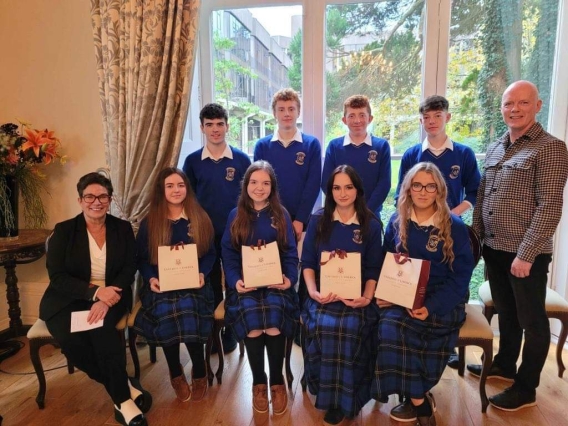A new University of Limerick designed engaged learning model programme for Transition Year students has been launched.
The PLACE Model: Engaged Learning for TY Students was launched at an event in Plassey House this week.
With teams from 6 European countries, the University of Limerick EU Erasmus+ funded SLUSIK project developed a new model for engaged learning for secondary level students.
Entitled PLACE - which stands for: Prepare, Link, Action, Celebrate and Effect - it is aimed at enhancing soft skills and social inclusion of secondary school students.
The overall design was led by UL team and successful field trials across Europe were completed last semester.
The PLACE model encourages students to learn about their own ability to effect change in their wider community and raise aspirations for the future.
Eight students from Coláiste Ióseaf Community College in Kilmallock, Co Limerick are heading to Brussels in November to represent Ireland at a European Service-Learning conference. There, they will present their experiences about a range of different projects that they designed and delivered in their local communities.
“PLACE highlights that learning comes in many forms and guises, open to all and owned by none – it is a true opportunity to connect, to belong and to change the world around us,” explained Patrick Ryan, Associate Vice President Student Engagement at UL.
“This is a new opportunity for second level Transition Year students to ‘learn through doing’ with community groups, about themselves, the environment, and wider societal issues. The PLACE model is more than volunteering – students lead in co-created learning experiences, applying their ideas and making a difference in the world around them,” Professor Ryan added.
Despite the enormous challenges of the pandemic, TY students from Coláiste Mhichíl CBS Sexton Street, Coláiste Iósaef and Ardscoil Mhuire succeeded in developing innovative community initiatives.
The students’ ideas included addressing challenges in sustainable food, recycling, sexism, violence in communities, period poverty and declining bee populations.
The PLACE model encourages personal reflection throughout, encouraging students with different skills to participate in their communities in ways they may not have thought possible.
One of the Coláiste Iósaef students explained: “The highlight for me was probably the project where we went around the classrooms. It was great to get people involved in a matter that is actually so close to heart.”
UL will continue to facilitate the implementation of the PLACE model with interested DEIS schools, slowly expanding the number of schools involved, and encouraging the involvement of UL academic specialists as champions. The PLACE model aims to inspire and support young people to connect with community partners in new and exciting ways.
